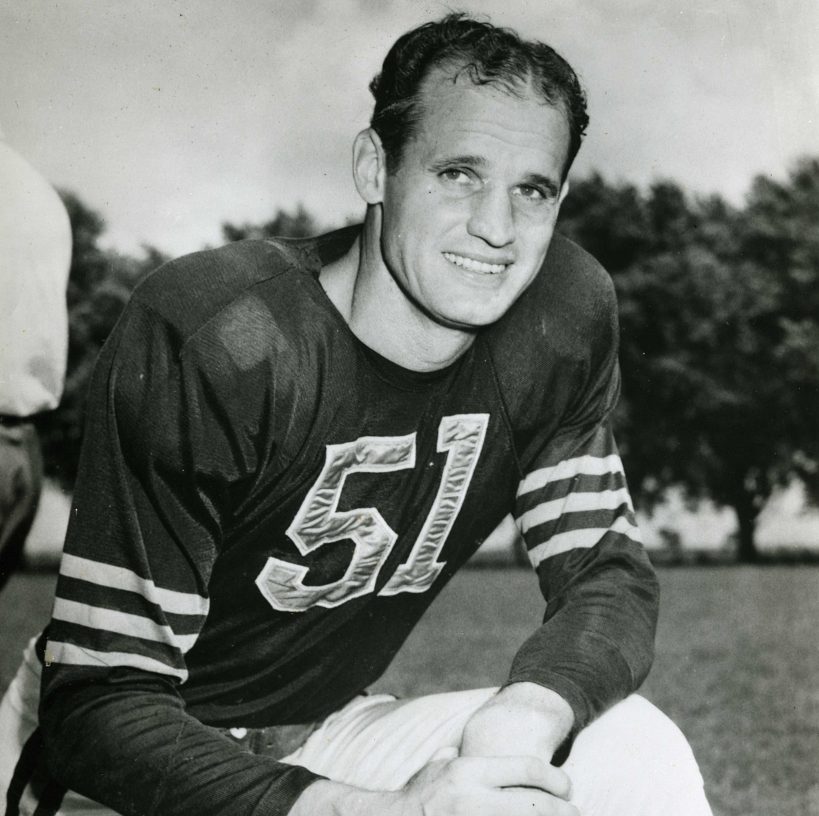
Ken Kavanaugh
Sport: Football
Induction Year: 1970
University: LSU
Induction Year: 1970
If Ken Kavanaugh didn’t do it, it didn’t get done for Coach Bernie Moore’s Louisiana State University Tigers in 1939.
The lanky 6-3 end from Little Rock, Ark., led the nation in pass receiving that year with 30 catches for 467 yards, setting school records that would stand for more than 30 years.
Kavanaugh was selected on the All-Southeastern Conference team for the second year in a row, and shared the Nashville Banner’s SEC Most Valuable Player award with Bob Foxx of Tennessee. He made the Associated Press All-America team, won the Knute Rockne trophy awarded to the nation’s most outstanding lineman and finished seventh in Heisman Trophy voting—an amazing achievement for a player whose team had a losing season. The six players above him in Heisman voting, all backs, played on teams that didn’t lose more than two games and were ranked among the Top 20 in the nation.
When LSU reeled off four consecutive victories early in the season, Kavanaugh scored nine of the Tigers’ 10 touchdowns—seven of them on passes from sophomore tailback Leo Bird and two on defensive plays. The Tigers’ other touchdown was a gift-wrapped score at the end of a game with Loyola. When a late LSU drive was stopped at the Loyola two yard-line, the Tigers intercepted a pass at the Wolfpack three yard-line and added a meaningless TD on the final play of the game—a pass from reserve tailback Gerald Hightower to Charles Johnson.
Kavanaugh’s nine touchdowns in those four games were more than half of the team total of 17 in a 4-5 season.
On Oct. 7, 1939, Kavanugh scored all four touchdowns in the Tigers’ 26-7 upste victory over Holy Cross at Worcester, Mass.—three on passes from Bird and one on a 80-yard run with an intercepted lateral.
That wasn’t Kavanaugh’s only defensive touchdown at LSU. Two years earlier, with Rice threatening to tie the Tigers in the third quarter, Kavanaugh snatched a fumble by “Red” Vickers out of mid-air and raced 100 yards for a touchdown that dashed the Owl’s upset hopes—and set a Southeastern Conference record that hasn’t been equaled since then.
For Kavanaugh, the most memorable aspect of the 1939 Holy Cross game was the trip. It was the first time any football team in the South traveled by airplane, and Kavanaugh was one of several Tigers who became airsick. Ironically, he became an Air Force pilot in World War II a few years later.
LSU fans listening the 1939 Holy Cross game were kept in suspense when the telephone line carrying the play-by-play account back to Louisiana was disconnected just as Bird launched a pass on fourth-and-12. Not until power was restored 20 minutes later did the Louisiana fans learn that the pass was completed for a touchdown.
The Tigers visited the World’s Fair the following day before flying back to New Orleans. When they arrived at the campus on Sunday night, they were greeted by a crowd of 5,000 fans at the Gym-Armory.
Responding to a “We want Kavanaugh” chant, Kavanaugh moved to the stage and said, “Thank you for the reception, but the boy you want up here is Leo Bird.”
The Shreveport sophomore joined his batterymate on the stage and said, “Kavanaugh has been catching passes before I came here, and he’ll keep on catching them. He’s the best pass receiver in the world, and he’s the best boy that ever hit this campus.”
Loyola held LSU to 11 yards rushing, but couldn’t prevent Kavanaugh from catching two more touchdown passes from Bird. “That blamed Kavanaugh,” Loyola coach Larry Mullins said after the game, “isn’t that guy a honey?”
Moore called Kavanaugh a “pass completer” rather than receiver “because he’d catch passes no one else could get to.”
Kavanaugh, who was also an outstanding baseball player at LSU, launched a spectacular National Football League career the following year as he led George Halas’ Chicago Bears in receiving with 12 catches for 376 yards and three touchdowns. When the Bears dropped a 7-3 decision to the Washington Redskins near the end of the season, Washington owner George Marshall called them “quitters” and “crybabies.” Three weeks later, the Bears and Redskins met again in the championship game. Chicago administered the worst beating ever in a an NFL title game to Marshall’s team, 73-0.
That was the first of three NFL championships for the Bears during Kavanaugh’s eight-year career. He caught passes for 3,622 yards, an average of 22.4 per reception that would be the NFL record if he had caught 32 more passes to meet the minimum requirement. Kavanaugh scored 50 touchdowns. Other receivers would surpass Kavanaugh’s touchdown total, but not his ratio for one touchdown for each 3.24 receptions.
Kavanaugh won All-Pro honors in 1947 and 1948, and scored touchdowns in all three NFL championship games that he played in—two on passes from Sid Luckman and one on a 42-yard fumble return for the final score in a 37-9 rout of the New York Giants two weeks after the Japanese bombed Pearl Harbor.










